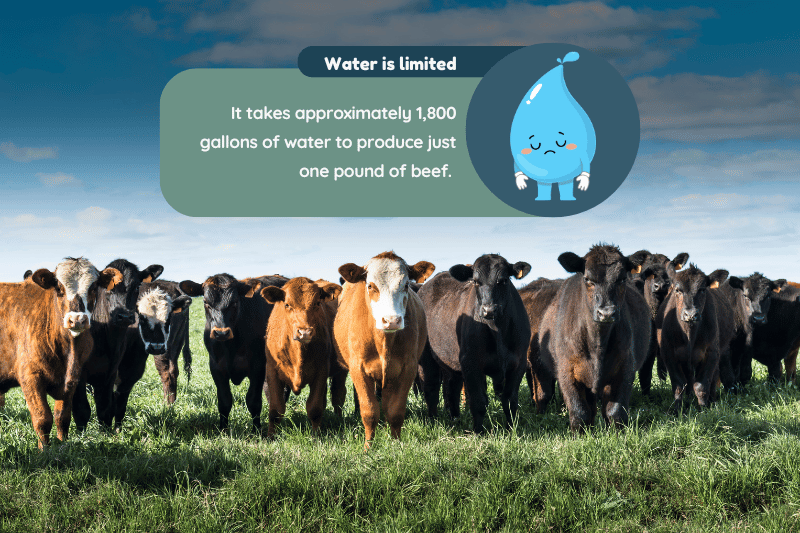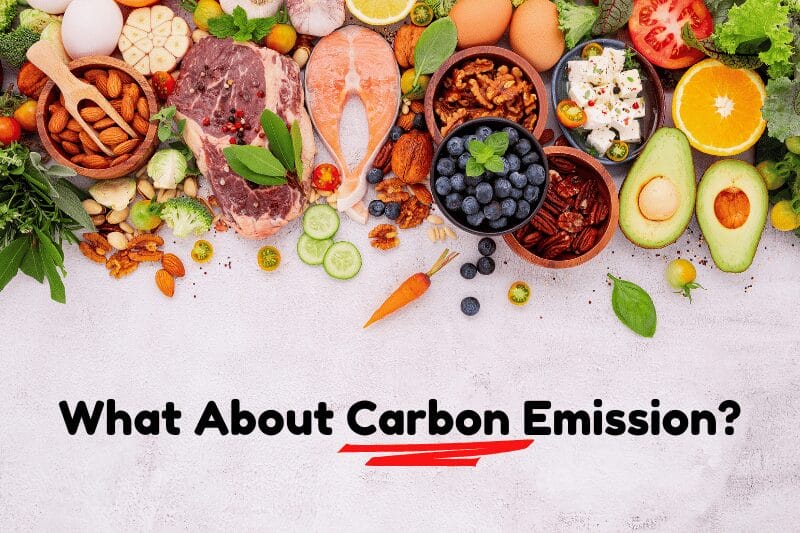Ever thought your dinner might be heating up the planet? That’s what happens with meat-heavy diets. Environmental concerns linked to meat consumption are alarming—think massive carbon footprints and water usage that’s through the roof.
By eating less meat, we can do our part to ease these environmental pressures. Plus, we can improve animal welfare by reducing the number of animals subjected to poor conditions in factory farms.
Cutting back not only slashes carbon emissions but also conserves water, slows down deforestation, and supports sustainable diets.
In this blog, we’ll explore how these small dietary changes can make a big difference for our planet.
Environmental Impact of Meat Production
Livestock farming is a major player in greenhouse gas emissions, contributing significantly to the warming of our planet. Cows, in particular, produce large amounts of methane—a potent greenhouse gas that’s about 25 times more effective than carbon dioxide at trapping heat in the atmosphere.
The scale of global meat production means these emissions add up quickly, making the meat industry a leading contributor to climate change.
Every time we choose meat, we indirectly support this cycle of emissions.
To address the overconsumption of meat, we need systemic changes in the food system. This transformation must encompass various stages of the supply chain, including production, processing, and consumer behavior, to achieve a healthy and sustainable food system.
Reducing dairy intake can also lead to significant environmental benefits, such as drastic reductions in land use and greenhouse gas emissions.

But we’re affecting more than just the air; we’re also affecting our water resources. Producing meat is incredibly water-intensive.
For example, it takes approximately 1,800 gallons of water to produce just one pound of beef. This staggering amount comes from the water used to grow feed crops, hydrate animals, and clean farming facilities.
In contrast, plant-based foods typically require far less water, making them a more sustainable choice. Reducing our meat consumption can help conserve this precious resource.
The environmental cost of meat production doesn’t stop at air and water—it’s also driving deforestation. Large areas of forests, especially in the Amazon, are cleared to create pastureland for cattle or to grow soy, which is then used as animal feed. This deforestation not only destroys vital ecosystems and the biodiversity within them but also releases stored carbon from trees into the atmosphere, further contributing to global warming.
Moreover, losing forests means losing natural carbon sinks, making it even harder to combat climate change.
Carbon Footprint of Different Foods

Here’s a breakdown of the carbon footprint associated with various foods. The carbon footprint is typically measured in kilograms of CO2 equivalent (kg CO2e) per kilogram of food produced:
High Carbon Footprint Foods
- Beef: ~27 kg CO2e per kg: Beef has one of the highest carbon footprints, primarily due to methane emissions from cattle and the large amounts of land, feed, and water required.
- Lamb: ~39 kg CO2e per kg: Lamb has an even higher footprint than beef, partly due to the inefficiency of converting feed into meat.
- Cheese: ~13.5 kg CO2e per kg: Cheese production is resource-intensive, particularly when made from cow's milk, which adds to its carbon footprint.
- Pork: ~12.1 kg CO2e per kg: Pork has a lower carbon footprint than beef but is still significant due to the feed required for pigs.
- Farmed Fish (e.g., Salmon): ~6-11 kg CO2e per kg: The footprint varies depending on the type of fish and farming practices, but farmed fish generally have a lower footprint than red meats.
Moderate Carbon Footprint Foods
- Chicken: ~6.9 kg CO2e per kg: Chicken is more efficient to produce than beef or pork, resulting in a lower carbon footprint.
- Eggs: ~4.8 kg CO2e per kg: Eggs have a moderate footprint, largely due to feed and housing for the hens.
- Rice: ~2.7 kg CO2e per kg: Rice's footprint comes mainly from methane emissions from flooded paddies, which is significant but lower than that of most animal-based foods.
Low Carbon Footprint Foods
- Peas: ~1.0 kg CO2e per kg: Peas and other legumes are very efficient in terms of land and water use, resulting in a low carbon footprint.
- Vegetables (average): ~0.5-2.0 kg CO2e per kg: The carbon footprint of vegetables varies depending on the type and farming practices, but they generally have a low impact.
- Fruits (average): ~0.5-2.0 kg CO2e per kg: Like vegetables, the carbon footprint of fruits can vary. Seasonal and locally sourced fruits tend to have a lower impact.
- Legumes (e.g., Lentils, Beans): ~0.9 kg CO2e per kg: Legumes are highly efficient to grow, with a very low carbon footprint, making them an excellent plant-based protein source.
Very Low Carbon Footprint Foods
- Nuts: ~0.3-1.6 kg CO2e per kg: Nuts have a low footprint, though it can vary depending on the type (e.g., almonds require a lot of water). They are still much lower in carbon than most animal products.
- Potatoes: ~0.4 kg CO2e per kg: Potatoes are very efficient to grow, contributing to their low carbon footprint.
These values are average estimates and can vary based on factors like farming practices, transportation, and whether the food is locally sourced or imported. Generally, plant-based foods have a much lower carbon footprint compared to animal-based foods.
Sustainable Diets That Help You Eat Less Meat

Switching to a sustainable diet is one of the best things you can do for the planet. It’s not just about what you eat but how it affects the world around you.
Some diets focus on reducing or even eliminating meat, and the impact on the environment is huge. A plant-based diet, in particular, plays a significant role in reducing meat consumption and promoting sustainability.
Incorporating more plant-based proteins into your diet not only supports environmental sustainability but also offers numerous health benefits.
Here’s a look at how different diets contribute to sustainability:
Blue Zones Diet
Imagine living to 100 and still going strong! That’s what happens in places called Blue Zones. These folks have cracked the code to a long, healthy life, and a big part of it is their diet.
They mostly eat plants—think veggies, fruits, beans, and whole grains.
Meat? It’s more of a rare treat.
This diet isn’t just good for your health; it’s good for the Earth. By eating less meat, you help cut down on greenhouse gases, save water, and keep forests from being chopped down. The Blue Zones Diet is like a secret recipe for living longer and saving the planet.
Pescatarian Diet
Love fish? Then the Pescatarian Diet might be your sustainable eating solution.
This diet is all about fish and plants, with other meats left out.
Fish has a lower carbon footprint than beef, pork, or lamb, especially when you’re careful about where it comes from.
By going pescatarian, you’re not just eating healthier—you’re helping the environment by lowering methane emissions, saving water, and reducing the demand for land used to raise livestock.
Planetary Health Diet
Think of the Planetary Health Diet as a game plan for eating that’s good for you and the Earth. It’s like having a personal trainer for your diet, only this one cares about the planet too.
The idea is to cut way back on red meat and sugar and load up on fruits, veggies, nuts, and beans.
This diet is designed to keep you healthy without pushing the planet to its limits. By following it, you’ll help conserve natural resources, slash carbon emissions, and support more sustainable farming practices.
New Nordic Diet
Ever wonder how to eat like a Viking—minus the whole pillaging thing?
The New Nordic Diet has you covered. It’s all about eating locally sourced, seasonal foods that grow in the Nordic region, which means less environmental impact from transporting food.
Plus, it’s heavy on plant-based dishes like root vegetables, legumes, and whole grains.
By focusing on what’s in season and reducing meat, this diet supports local farmers and helps you keep your carbon footprint in check. It’s sustainable, delicious, and has a cool, northern vibe.
Mediterranean Diet
The Mediterranean Diet is famous for being good for your heart, but did you know it’s also great for the planet?
This diet is rich in fruits, veggies, whole grains, and olive oil, with only a small amount of red meat. Instead, it leans on fish, poultry, and plant-based proteins like beans and nuts.
By following the Mediterranean Diet, you’re not only eating healthier—you’re also reducing your carbon footprint and conserving resources tied to meat production. It’s a tasty way to do your part for the Earth.
Flexitarian Diet
Not ready to give up meat completely? The Flexitarian Diet could be your answer. It’s a more laid-back approach that encourages eating more plants and cutting down on meat gradually.
This flexibility makes it easier to adopt and stick with. Even by reducing your meat intake occasionally, you can help lower greenhouse gas emissions, save water, and protect forests.
The Flexitarian Diet is all about making small changes that add up to big benefits for the environment. Plus, you still get to enjoy your favorite meat dishes—just less often.
How to Transition to a Low-Meat Diet

Reducing meat consumption is a powerful step toward a healthier lifestyle and a more sustainable planet. But making the shift doesn’t have to be overwhelming.
Here are some practical tips and plant-based alternatives to help you ease into a low-meat diet.
Practical Tips for Gradually Reducing Meat Consumption
- Start Small: Begin by cutting out meat from one meal a day. Breakfast is a great place to start—try oatmeal with fruits or a veggie-packed smoothie.
- Meatless Mondays: Commit to one meat-free day each week. This simple change can make a big impact over time and helps you discover new plant-based recipes.
- Portion Control: If giving up meat entirely feels too daunting, try reducing your portion sizes. Use meat as a side dish rather than the main attraction on your plate.
- Explore New Recipes: Incorporate plant-based meals into your weekly routine. Experiment with vegetarian versions of your favorite dishes—like spaghetti with lentil bolognese or tacos with black beans.
- Plan Ahead: Planning your meals in advance can prevent you from defaulting to meat-based options. Stock up on plant-based ingredients and keep your pantry full of staples like beans, grains, and spices.
Popular Plant-Based Alternatives
- Tofu: A versatile soy product that absorbs flavors well. It can be grilled, stir-fried, or added to soups for a protein boost.
- Tempeh: Made from fermented soybeans, tempeh has a nutty flavor and firm texture. It’s perfect for sandwiches, salads, or stir-fries.
- Legumes: Beans, lentils, and chickpeas are protein-packed and can be used in a variety of dishes, from stews to salads to veggie burgers.
- Mushrooms: With their meaty texture, mushrooms make an excellent substitute in dishes like burgers or stir-fries.
- Seitan: Often called “wheat meat,” seitan has a chewy texture and is great for mimicking chicken or beef in recipes.
Helping Environment One Meal At a Time
Eating less meat is a simple yet powerful way to contribute to a healthier planet. By reducing meat consumption, you can help lower greenhouse gas emissions, conserve water, protect forests, and promote more sustainable agricultural practices.
To achieve a healthy and sustainable food system, systemic changes are needed across various stages of the supply chain, including production, processing, and consumer behavior.
Every meal that swaps meat for plant-based alternatives makes a difference, not only for the environment but also for your health. Small changes in your diet can lead to significant positive impacts on the world around us.
So, whether you’re cutting back a little or a lot, every step towards a low-meat diet is a step towards a more sustainable future.

